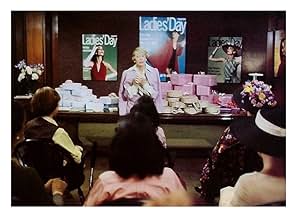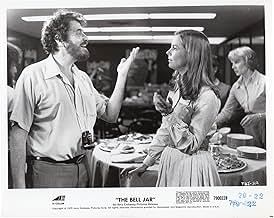Füge eine Handlung in deiner Sprache hinzuAs the horrors beneath the idealized 1950s come about, a successful young woman finds herself having a serious mental breakdown when she returns to New England.As the horrors beneath the idealized 1950s come about, a successful young woman finds herself having a serious mental breakdown when she returns to New England.As the horrors beneath the idealized 1950s come about, a successful young woman finds herself having a serious mental breakdown when she returns to New England.
- Regie
- Drehbuch
- Hauptbesetzung
Empfohlene Bewertungen
i saw this a few months ago and i hope i never will have to again...i was not expecting something so hideously bad and corny....julie harris couldn't even save it...she was the only one who acted with some dignity...everything in the movie is jumbled and done wrong...the book is amazing, don't get me wrong, i love it to death..it's one of my all-time favourites, absolutely brilliant...but i find it sad how terrible the only movie it was made into is....i could've done a better job with the idea and i don't even know the first thing about moviemaking
I saw this movie when it first came out, before I had read the book. It's impossible to capture the immensity of Esther's pain as she staggers toward oblivion, but watching the movie gave me a definite sense of a life in utter chaos. Yes, the film is flawed, but in my mind it stands alone as a separate entity. Marilyn Hassett's portrayal of Esther is terrifying--I haven't empathized so completely with a character on the brink of dementia since Kathleen Quinlan as Deborah in "I Never Promised You A Rose Garden." The supporting cast is equally solid--it's not their fault that there's just too much ground for one little movie to cover. Donna Mitchell stays in my mind as creating, in Joan's character, a young woman as doomed and in as much mental disarray as Esther. Mitchell is an amazingly underrated (and under-used) actress. I'm not sure if our boys would have given it two thumbs up, but it remains one of my closet classics.
While Marilyn Hassett is a fine actress (she's absolutely wonderful as Jill Kinmont in the "Other Side of the Mountain" movies), she was totally miscast in "The Bell Jar". According to the book, the character of Esther Greenwood was nineteen, and Ms. Hassett was almost thirty-two at the time of this filming. Sylvia Plath's novel is a haunting, harrowing, timeless classic, and the film reflected none of that. It was a mess. Read the book instead.
Jameson Parker And Marilyn Hassett are the screen's most unbelievable couple since John Travolta and Lily Tomlin. Larry Peerce's direction wavers uncontrollably between black farce and Roman tragedy. Robert Klein certainly think it's the former and his self-centered performance in a minor role underscores the total lack of balance and chemistry between the players in the film. Normally, I don't like to let myself get so ascerbic, but The Bell Jar is one of my all-time favorite books, and to watch what they did with it makes me literally crazy.
This movie is one of the few I actually bought several copies of. Though it is circa 1979, it is not dated, and so much more effective than the recent "Sylvia" film, which is dominated by Gwyneth Paltrow's persona.
Marilyn Hassett plays the principal role, and does an excellent job. She does not overshadow the personality of Sylvia Plath, who was an interesting, conflicted and brilliant individual.
The story follows Sylvia at Smith College, where a young Donna Mitchell ("Mona Lisa Smile" mother to Kirsten Dunst), plays her best friend. The scenery invokes New England autumn, promise and hope. Julie Harris is perfect as Aurelia Plath, Sylvia's mother. We can almost feel Sylvia's disdain, as her mother reminds Sylvia ...""you got nothing but straight A's....oh, except for deportment"... Her mother is always at her, and this mirrors Sylvia's eventual faltering self-image.
The story progresses as she wins a scholarship to NY where ..."ëvery one envied me that summer"... However, there is the fateful backdrop of the Rosenbergs, the Eisenhower era, and Sylvia's doubts about her future. We see fashion shows, jewelry, cosmetics, and the fear Sylvia has of what awaits her. One should also read the book to get her true impressions, which are quite astute, reflecting women's roles in the late 1950's.
Since it was the late 50's Sylvia was expected to marry, but does not see this as a viable solution, indeed it is a hindrance to her writing career. She is on the brink of decision, when she has the ultimate breakdown; I will not delineate the detail, you must watch the brilliantly constructed story, which leads her to her decision. The main issue I liked was that her life was shown, not in conjunction with a man (like the more recent movie) but how SHE was affected, and what life meant to her.
Marilyn Hassett plays the principal role, and does an excellent job. She does not overshadow the personality of Sylvia Plath, who was an interesting, conflicted and brilliant individual.
The story follows Sylvia at Smith College, where a young Donna Mitchell ("Mona Lisa Smile" mother to Kirsten Dunst), plays her best friend. The scenery invokes New England autumn, promise and hope. Julie Harris is perfect as Aurelia Plath, Sylvia's mother. We can almost feel Sylvia's disdain, as her mother reminds Sylvia ...""you got nothing but straight A's....oh, except for deportment"... Her mother is always at her, and this mirrors Sylvia's eventual faltering self-image.
The story progresses as she wins a scholarship to NY where ..."ëvery one envied me that summer"... However, there is the fateful backdrop of the Rosenbergs, the Eisenhower era, and Sylvia's doubts about her future. We see fashion shows, jewelry, cosmetics, and the fear Sylvia has of what awaits her. One should also read the book to get her true impressions, which are quite astute, reflecting women's roles in the late 1950's.
Since it was the late 50's Sylvia was expected to marry, but does not see this as a viable solution, indeed it is a hindrance to her writing career. She is on the brink of decision, when she has the ultimate breakdown; I will not delineate the detail, you must watch the brilliantly constructed story, which leads her to her decision. The main issue I liked was that her life was shown, not in conjunction with a man (like the more recent movie) but how SHE was affected, and what life meant to her.
Wusstest du schon
- WissenswertesDirector Larry Peerce and star Marilyn Hassett were married at the time of production.
- PatzerEarly in the picture an early-'50s New York cab has a telephone number on it beginning with "555". The all-numeric phone numbers were not put into use for another decade.
- Zitate
Esther Greenwood: To the person in the bell jar, blank and stopped as a dead baby, the world itself is the bad dream.
- Alternative VersionenCBS edited 16 minutes from this film for its 1983 network television premiere.
- SoundtracksHere Comes The Night
Written and Performed by Janis Ian
Produced by Janis Ian and Ronald Frangipane
Arranged and Conducted by Ronald Frangipane (uncredited)
Top-Auswahl
Melde dich zum Bewerten an und greife auf die Watchlist für personalisierte Empfehlungen zu.
- How long is The Bell Jar?Powered by Alexa
Details
Zu dieser Seite beitragen
Bearbeitung vorschlagen oder fehlenden Inhalt hinzufügen































